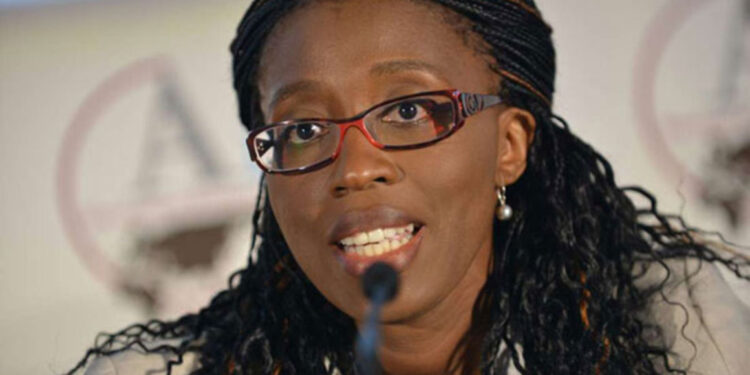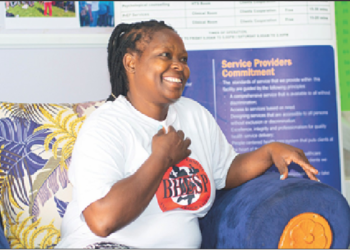
Vera Songwe, Uneca’s Executive Secretary. FILE PHOTO | NMG
AfCFTA is a statement by Africans saying that they want to take control, own and have a view of their own economic relationships, and as a continent, have slightly more power regarding their trade. Countries want to exploit these benefits to grow faster and create jobs.
Agoa, for instance, was opened to 49 countries, and though 35 tried to take advantage of it, only seven are benefiting. The AfCFTA will help with these negotiations and tell our international partners that they need to bring more to the table, not less.
What strategy should members employ to ensure the agreement is fully and well implemented?
Ministers of Finance have an important role to play to help implement the agreement. The Trade ministers played their role during the negotiations but the Finance ministers understand the implications of the AfCFTA.
Taxes and Customs, for example, which are key components of AfCFTA are matters under the finance ministries. It is up to these ministers to evaluate if and how revenue collection will increase in their respective countries and how these revenues will be spent.
Once countries ratify the document, they have 10 years and some have even 13 years to put policies in place to fully take advantage of the AfCFTA. The countries will have to invest in policy, human and fiscal infrastructure to make it realisable.
Some issues under the AfCFTA were not concluded. Are they the most contentious issues that countries have failed to agree on?
No. Countries only agreed to negotiate further about these issues. They will address them in the second phase of the negotiations.
It is the same for the global trade agreements. Negotiations are never concluded at once and are usually staggered. Some of the issues, such as e-commerce, are new to most countries.
Africa is actually leap-frogging because we are already discussing e-commerce unlike the other countries across the globe.
This is very important for countries like Kenya that is well developed in terms of technology but we have to bring the other countries on board and help them to better understand e-commerce.
We hope that by 2020 discussions will be concluded. We do not want a situation where AfCFTA opens up some countries to unfair competition.
Africa still borrows more from without to fund its own projects. How can this trend be reversed so that countries start borrowing from their own banks?
Our banks have no capacity to evaluate projects or even fund them. We need to strengthen our banks first so that they can assess such projects and ultimately, fund them. States have to improve on their revenue collection and save more in their banks to enable them borrow.
Indeed, we have witnessed a lot of theft of resources and there is need to improve domestic resource mobilisation to generate more revenue locally.
What is your vision for the ECA?
The UN Economic Commission for Africa’s (Uneca) is an institution that can provide ideas to transform the continent for economic growth and prosperity. We want to be the go-to think tank of Africa through action and results.
How will you go about this?
I will strengthen the quality of staff and increase the human capacity to help countries focus and redefine their economies to nurture growth. I will work closely with the private sector and incorporate them in our discussions and advisory matters.
I will also focus on transboundary matters concerning water sharing and political relationships like the current case of the Sahel and Morocco. These issues need to be resolved urgently.
Globally, I will do more advocacy for Africa on taxation, migration, climate change, trade, peace and security. I am restructuring the ECA by introducing new divisions to handle different concerns or assist with crucial matters.
For instance, we have created a division on the private sector because we hope to engage more with this sector on macroeconomics, finance and poverty.
What about women’s contribution?
Starting in-house, I hope to increase the number of women on the staff to match their male counterparts at the ECA because I intend to use women more to define policy.
Not much has been done to define how women should be integrated into the economic decisions affecting the continent and we are losing much as a result.
Various studies have established that there are too few women involved in these discussions and decision making. I intend to change this. We are working on creating a women fund to economically empower women in Africa.
How do you propose to mobilise resources for the ECA?
We will approach our traditional partners, bring on board new ones, such as the private sector and NGOs, but also universities to address intellectual matters.

Vera Songwe, Uneca’s Executive Secretary. FILE PHOTO | NMG
AfCFTA is a statement by Africans saying that they want to take control, own and have a view of their own economic relationships, and as a continent, have slightly more power regarding their trade. Countries want to exploit these benefits to grow faster and create jobs.
Agoa, for instance, was opened to 49 countries, and though 35 tried to take advantage of it, only seven are benefiting. The AfCFTA will help with these negotiations and tell our international partners that they need to bring more to the table, not less.
What strategy should members employ to ensure the agreement is fully and well implemented?
Ministers of Finance have an important role to play to help implement the agreement. The Trade ministers played their role during the negotiations but the Finance ministers understand the implications of the AfCFTA.
Taxes and Customs, for example, which are key components of AfCFTA are matters under the finance ministries. It is up to these ministers to evaluate if and how revenue collection will increase in their respective countries and how these revenues will be spent.
Once countries ratify the document, they have 10 years and some have even 13 years to put policies in place to fully take advantage of the AfCFTA. The countries will have to invest in policy, human and fiscal infrastructure to make it realisable.
Some issues under the AfCFTA were not concluded. Are they the most contentious issues that countries have failed to agree on?
No. Countries only agreed to negotiate further about these issues. They will address them in the second phase of the negotiations.
It is the same for the global trade agreements. Negotiations are never concluded at once and are usually staggered. Some of the issues, such as e-commerce, are new to most countries.
Africa is actually leap-frogging because we are already discussing e-commerce unlike the other countries across the globe.
This is very important for countries like Kenya that is well developed in terms of technology but we have to bring the other countries on board and help them to better understand e-commerce.
We hope that by 2020 discussions will be concluded. We do not want a situation where AfCFTA opens up some countries to unfair competition.
Africa still borrows more from without to fund its own projects. How can this trend be reversed so that countries start borrowing from their own banks?
Our banks have no capacity to evaluate projects or even fund them. We need to strengthen our banks first so that they can assess such projects and ultimately, fund them. States have to improve on their revenue collection and save more in their banks to enable them borrow.
Indeed, we have witnessed a lot of theft of resources and there is need to improve domestic resource mobilisation to generate more revenue locally.
What is your vision for the ECA?
The UN Economic Commission for Africa’s (Uneca) is an institution that can provide ideas to transform the continent for economic growth and prosperity. We want to be the go-to think tank of Africa through action and results.
How will you go about this?
I will strengthen the quality of staff and increase the human capacity to help countries focus and redefine their economies to nurture growth. I will work closely with the private sector and incorporate them in our discussions and advisory matters.
I will also focus on transboundary matters concerning water sharing and political relationships like the current case of the Sahel and Morocco. These issues need to be resolved urgently.
Globally, I will do more advocacy for Africa on taxation, migration, climate change, trade, peace and security. I am restructuring the ECA by introducing new divisions to handle different concerns or assist with crucial matters.
For instance, we have created a division on the private sector because we hope to engage more with this sector on macroeconomics, finance and poverty.
What about women’s contribution?
Starting in-house, I hope to increase the number of women on the staff to match their male counterparts at the ECA because I intend to use women more to define policy.
Not much has been done to define how women should be integrated into the economic decisions affecting the continent and we are losing much as a result.
Various studies have established that there are too few women involved in these discussions and decision making. I intend to change this. We are working on creating a women fund to economically empower women in Africa.
How do you propose to mobilise resources for the ECA?
We will approach our traditional partners, bring on board new ones, such as the private sector and NGOs, but also universities to address intellectual matters.
















